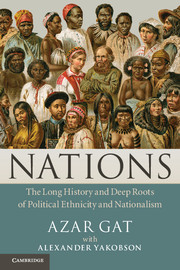Book contents
- Frontmatter
- Contents
- Acknowledgments
- 1 Introduction: is nationalism recent and superficial?
- 2 The evolution of kin–culture communities
- 3 From tribes to statehood
- 4 Premodern ethne, peoples, states, and nations around the world
- 5 Premodern Europe and the national state
- 6 Modernity: nationalism released, transformed, and enhanced
- 7 State, national identity, ethnicity: normative and constitutional aspects
- Conclusion
- Notes
- Index
- References
2 - The evolution of kin–culture communities
Published online by Cambridge University Press: 05 February 2013
- Frontmatter
- Contents
- Acknowledgments
- 1 Introduction: is nationalism recent and superficial?
- 2 The evolution of kin–culture communities
- 3 From tribes to statehood
- 4 Premodern ethne, peoples, states, and nations around the world
- 5 Premodern Europe and the national state
- 6 Modernity: nationalism released, transformed, and enhanced
- 7 State, national identity, ethnicity: normative and constitutional aspects
- Conclusion
- Notes
- Index
- References
Summary
The concepts of ethnic group and ethnicity were coined in English in the wake of the Second World War to replace the concept of race that had lost its legitimacy with Nazi racial doctrines and their horrendous application. Although race assumed a predominantly biological meaning from the late nineteenth century onward, it had traditionally denoted large communities of both cultural and “blood”-kin relatedness. Hence, the English race, French race, Japanese race, and so forth. Vaguely, the concept of ethnicity incorporates both the above meanings of a shared culture and kin relatedness. But it has retained semantic ambiguity because of lingering uneasiness regarding either of these elements, with the result that one or the other is often disregarded. As suggested here, both elements are integral to ethnicity, with their relative weight differing in each individual case, and they have been largely interconnected. I begin with kinship.
The application of evolutionary theory to explain basic human emotions, desires, and behavior – popularly known as “sociobiology” – has gained ground rapidly since the late 1970s, profoundly revolutionizing the study of man. Its relevance to our subject can be summarized as follows: people tend to prefer closer kin, who share more genes with them, to more remote kin or “strangers.” As a propensity this is not necessarily conscious. Like any natural predisposition, it evolved because those who acted upon it increased their genes’ representation in the human population and, consequently, also that predisposition itself. Obviously, kinship is not the only medium of human affinity and loyalty, but it is a major one and closely tied to the others. The argument that here lay the root cause of tribalism, ethnocentrism, and, at least partly, nationalism has been advanced by several scholars, of whom at least one, Pierre van den Berghe, is regularly cited in the scholarly literature on nationalism. And yet even when cited, the evolutionary message has had little impact on that literature.
- Type
- Chapter
- Information
- NationsThe Long History and Deep Roots of Political Ethnicity and Nationalism, pp. 27 - 43Publisher: Cambridge University PressPrint publication year: 2012

